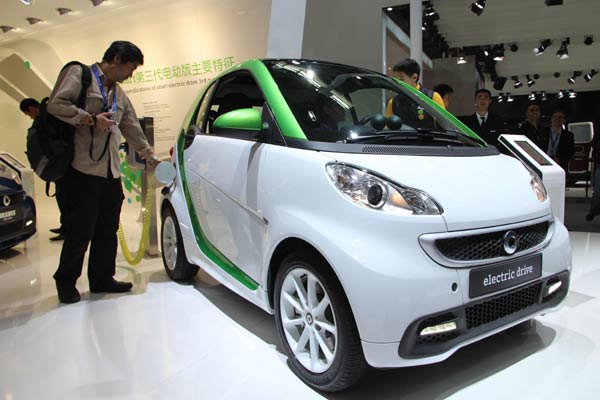 |
|
A new electric car is on show in Beijing. The future looks bright for electric cars in China amid rapidly fluctuating gasoline prices and huge investments by the government to promote use of clean energy.[Provided to China Daily] |
The warning that China's finance minister recently made against subsidy-related fraud may sound harsh to domestic new-energy vehicle producers who have relied heavily on such government funds to kick-start a domestic boom of green cars.
But it does not mean the Chinese government is any less committed to making the country a champion of green cars.
Instead, such a precaution against the possible misuse of subsidies for new energy cars has highlighted the very high hopes Chinese policymakers are pinning on such cars for a low-carbon future.
Production and sales of new energy cars significantly accelerated last year in China. The country's output of new energy vehicles quadrupled to 379,000, while the number sold more than tripled year-on-year to 331,100 in 2015, thanks to favorable policies and big subsidies to encourage their use, according to the Ministry of Industry and Information Technology.
New energy cars accounted for less than 2 percent of China's total vehicle sales of a record 24.6 million units sold last year. This remarkable growth momentum has given rise to confidence that China, the world's largest car market, may also become the world's greenest one.
However, while recognizing the huge impetus that government subsidies have created for the accelerated development of green cars, Chinese policymakers have also noticed that some enterprises are merely making the most of the subsides and favorable policies instead of making real technological breakthroughs.
To end the dependence on subsidies, the government has announced its plan to cut such subsidies by 20 percent between 2017 and 2018 from 2016 levels, and by 40 percent between 2019 and 2020.
And the Finance Ministry plans to conduct special checks on the use of the subsidies and has vowed to severely punish those involved in subsidy-related fraud.
On the one hand, the government has heeded the bitter lessons from the rapid growth of the photovoltaic industry in China on the back of hefty subsidies and the huge losses the sector suffered as a result of oversupply. On the other hand, domestic producers' heavy dependence on subsidies also calls for early actions to reduce government aid for those focusing on low-technology cars.
If China's green car producers are to survive market competition, they must focus on making technological breakthroughs to sharpen the competitive edge of their cars. And the government has an obligation to ensure the subsidies go to these enterprises to make a better use of public funds.
Last year's boom in green cars has only made this task more urgent than ever.